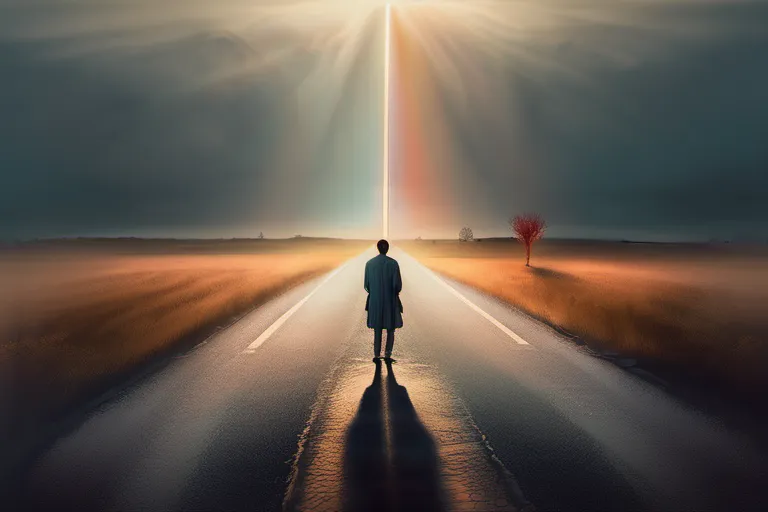Exploring the reasons behind faith loss, its impact on individuals and society, and potential solutions.
Faith is a deeply personal and complex aspect of human life. However, many people experience moments of doubt or even complete loss of faith. This article delves into the various factors that contribute to this phenomenon, its effects on individuals and communities, and offers insights for those seeking to regain their faith.
The Roots of Faith Loss
Why do people lose faith? Is it like a tree losing its leaves in autumn, changing due to environmental conditions and internal growth? Or perhaps more like a ship navigating through stormy seas, facing unpredictable challenges that test its resolve?
Personal experiences often serve as the first waves that stir the calm waters of belief. How can one remain untouched when faced with the harsh reality of losing a loved one or experiencing profound suffering? These events challenge our understanding of a world supposed to be just and kind. Could it be that these experiences force us to question everything, leading to a crisis of faith?
Societal pressures also play a crucial role in this process. Imagine walking down a path where everyone else believes one way; you might find yourself feeling isolated or misunderstood. Questions arise: Is it worth compromising your beliefs for societal acceptance? Or is it better to stand firm, even if it means going against the crowd?
Intellectual doubts further complicate matters. Can we truly reconcile faith with scientific discoveries and philosophical inquiries that challenge traditional views? This journey of questioning can be both exhilarating and terrifying, like wandering through a maze where every turn reveals new puzzles to solve.
The reasons behind losing faith are complex and multifaceted, intertwining personal struggles, societal influences, and intellectual curiosity. Each person’s path is unique, yet the questions remain universal: How do we navigate this shifting landscape of beliefs? And what does it mean for our identity when we lose something so fundamental?
The Impact of Faith Loss on Individuals
Imagine you’re standing at a crossroads, where the bright lights of hope and certainty suddenly dim, replaced by shadows of doubt. How does this affect your inner landscape? Faith loss can be as complex and varied as its reasons, impacting individuals in profound ways. Can you feel the weight of emotional turmoil as it settles on your shoulders? It’s like a gentle breeze one moment, but then a fierce storm that rages within.
Mental health can take a hit when faith is lost. The clouds of uncertainty gather, often bringing with them anxiety and depression. How do you navigate through these emotional mazes? It’s like trying to find your way in a dense fog—every step feels uncertain. Some turn to therapy or counseling as a lifeline, seeking guidance from mental health professionals who understand the intricacies of such profound changes.
On a spiritual level, the loss of faith can leave a void that’s hard to fill. It’s like losing a map in a vast and unfamiliar territory—where do you find your bearings? Many people turn to other spiritual practices or even explore different religions to regain a sense of purpose. Some might seek solace in nature, finding peace in the simplicity of the natural world. Others may lean on literature, art, or philosophy to fill the gap left by their former beliefs.
Coping mechanisms vary widely from person to person. Some find comfort in community, seeking support groups where they can share their experiences with others who have walked similar paths. Others might engage in self-care practices such as meditation, journaling, or engaging in hobbies that bring joy and fulfillment. It’s crucial to find what works for you, whether it’s a structured approach or more spontaneous acts of creativity.
Ultimately, the journey through faith loss is deeply personal. Each step, every emotion, and every decision shapes who we are. As you move forward, remember that healing can be gradual and messy, but it is possible to find new paths and rebuild your sense of self and purpose. How will you choose to navigate this challenging terrain?
The Role of Society in Faith Loss
How does society contribute to the erosion of faith, and can it also play a role in supporting those who are struggling? These questions are as complex as they are profound. Society acts like a vast, ever-moving river, shaping our beliefs and doubts alike. It often serves as both a source of comfort and a catalyst for change. Think about it: do we not find ourselves reflecting on the values and norms that surround us every day?
On one hand, society can be a powerful force in fostering doubt. When people see rampant materialism or superficiality in their communities, they may question the deeper meanings of life and faith. Is it just about accumulating more possessions or achieving status? Or is there something more profound at play here? The constant bombardment of conflicting information, often on social media platforms, can also lead to a sense of confusion and loss of faith.
Yet, society has the potential to offer solace and support as well. Think about how communities come together during times of crisis or celebration. They share stories, beliefs, and traditions that can reinforce one’s faith. Supportive groups, whether online or in person, provide a space for individuals to explore their doubts without fear of judgment. These communities can be like islands of stability in a stormy sea.
So, how can we create more supportive societies? One approach is through education and open dialogue. By fostering environments where people can openly discuss their beliefs and doubts, we can reduce the stigma associated with losing faith. Schools and community centers could host forums and workshops that encourage respectful conversations about spirituality and belief systems.
Another way is through promoting inclusivity and diversity. Recognizing and respecting different perspectives can help individuals feel less isolated in their struggles. By celebrating a variety of traditions and beliefs, society can show that it values the rich tapestry of human experience.
In essence, society plays a dual role in faith loss—both as an environment that can sow doubt and as a place where support and understanding are possible. The key lies in creating communities that are open, inclusive, and supportive, where individuals can find solace and encouragement amidst their doubts. After all, the journey of faith is not just personal; it is also deeply social.
Faith Loss and Spirituality
Have you ever wondered why some people lose their faith? The journey from believing to doubting can be as turbulent as a stormy sea, and it often leaves one questioning not just their beliefs but also their very sense of identity. Faith loss is a complex phenomenon that intertwines with our personal spiritual journeys in unique ways. Consider the metaphor of a tree; when the roots are shaken by doubt, does it mean the tree will wither away? Or could there be another way for the tree to find its strength and continue to grow?
Exploring the relationship between faith loss and spirituality is crucial. Many find that even in moments of deep questioning, a spiritual connection can still exist. It’s like navigating through a foggy landscape; while visibility may be low, there are still subtle signs pointing towards something greater. For instance, some people might turn to meditation or nature walks as a way to reconnect with their inner self and the world around them. These practices help in fostering a sense of peace and understanding that transcends traditional religious frameworks.
Maintaining a spiritual connection during times of doubt is not just about finding answers but also about asking the right questions. It’s like planting seeds of curiosity and openness in your mind, allowing them to grow into deeper insights. Engaging with different spiritual practices or communities can provide a support network that offers comfort and guidance. These connections remind us that even when we feel lost, there are others who share similar experiences and can offer encouragement.
Ultimately, the journey of faith loss and spirituality is deeply personal. It’s about finding your own path in the vastness of existence, understanding that doubts and questions are not just challenges but opportunities for growth. By embracing this process, one can find a renewed sense of purpose and connection to something greater than themselves.
So, how do you navigate through the stormy seas of doubt? What practices or communities resonate with your soul during times of questioning? Share your experiences; perhaps together we can explore more paths that lead to spiritual fulfillment even in moments of uncertainty.
Regaining Faith: Strategies for Hope
Regaining faith isn’t just about finding your way back; it’s like navigating through a thick fog to find the path that once led you clearly. Have you ever wondered if there’s more to life than what meets the eye? Many find themselves questioning their beliefs, wondering if they’ve strayed too far from the spiritual home they once knew. Is faith something you can regain, or is it a journey you must undertake anew?
Making that decision to reclaim your faith isn’t easy. It’s like rebuilding a ship after a storm has battered its hull. You start small, with simple acts of prayer and meditation. Prayer becomes not just a ritual but a conversation, a way to reconnect with the divine in a deeply personal manner. Meditation helps you clear away the noise that clouds your mind, allowing for moments of clarity and peace.
Engaging with community is another powerful tool. Attending church services or joining faith-based groups can provide support and encouragement. ‘Isolation breeds doubt,’ many find comfort in knowing they’re not alone on this journey. It’s like finding a map to guide you through uncharted waters, where others have navigated before.
Ultimately, the key is to embrace hope as your constant companion. Hope isn’t just about waiting for something; it’s also about making choices that align with your faith. Small steps can lead to significant changes, like planting a seed and watching it grow into a tree of strength and resilience. Remember, every journey begins with a single step.
In the end, regaining faith is about rediscovering what once brought you comfort and purpose. It’s a journey that requires patience, courage, and openness. Are you ready to embark on this path?
The Future of Faith: A Hopeful Outlook
The future of faith, like any journey through life’s tumultuous waters, holds both challenges and opportunities. As we look ahead, it’s important to recognize that loss of faith can be a transformative experience, much like the metamorphosis of a caterpillar into a butterfly. Just as a butterfly emerges stronger after its transformation, individuals who have lost their faith may find new ways to connect with the world around them.
One might wonder if faith will continue to evolve or perhaps even disappear in our modern society. However, history teaches us that resilience is inherent in human nature. People often find solace and meaning through various forms of spirituality, whether it be through nature, art, science, or community service. Faith can take many shapes, much like the colors in a rainbow, each offering unique hues to the tapestry of life.
It’s also crucial to consider that faith is not just about belief; it’s about action. Even those who have lost their traditional religious beliefs may still seek purpose and meaning through acts of kindness, charity, or environmental stewardship. These deeds can become a new form of faith—a faith in humanity’s ability to heal itself and the world.
As we navigate this uncertain future, let us embrace the diversity of human experience. Each person’s journey is unique, just as each leaf on a tree is distinct yet part of the same whole. By fostering understanding and compassion, we can create environments where people feel safe to explore their spiritual landscapes without fear.
Ultimately, the future of faith lies not in holding onto outdated traditions but in adapting to new understandings and experiences. It’s a journey of discovery, one that requires courage, openness, and a willingness to embrace change. In this process, we can find new meanings and continue to grow as individuals and as a society.
Conclusion
 While faith loss is a common experience, it doesn’t have to be permanent. Understanding the reasons behind it can help individuals find their way back or make informed decisions about their spiritual journey. This article provides a roadmap for navigating this complex issue and offers hope for those seeking answers.
While faith loss is a common experience, it doesn’t have to be permanent. Understanding the reasons behind it can help individuals find their way back or make informed decisions about their spiritual journey. This article provides a roadmap for navigating this complex issue and offers hope for those seeking answers.











